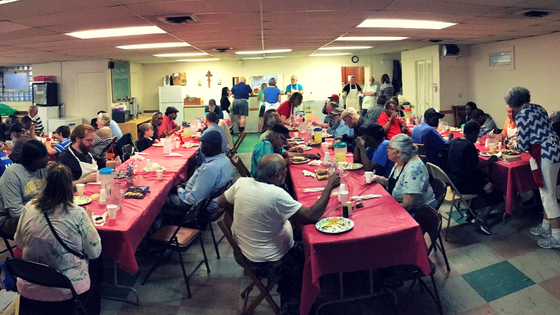This post was originally published on this site
Last Sunday Fr. Barnabas Powell interviewed FOCUS’ Executive Director, Seraphim Danckaert, on his live radio show Faith Encouraged. Their conversation covered the theology of caring for the poor and how it relates to our salvation.
As humans made in the image and likeness of Christ, we are called to serve the poor.
There are many types of poverty. When hear individuals or communities being described as poor – most often we are hearing stories of physical or financial poverty. Providing assistance for those who do not having the necessities to survive is a worthy cause to champion, and central to FOCUS’ mission as an organization. However, there are also other types of poverty less often heard or spoken about; spiritual poverty, emotional poverty, and even psychological poverty.
 If we look beyond our stereotypical ideas of who we think of when we hear the word “poor”, we might find opportunities to carry out our calling to serve in more encounters than we might think.
If we look beyond our stereotypical ideas of who we think of when we hear the word “poor”, we might find opportunities to carry out our calling to serve in more encounters than we might think.
A coworker who sent a rude email could be dealing with a loss in his family and need someone to care.
A neighbor might be worried about how they are going to afford their mortgage payment next month.
A stranger you see sleeping at the park where you walk your dog might be living in their car, working night shifts trying to save up money for a security deposit.
The list could go on and on and on. How do we know who to serve when a case could be made that everyone we encounter could be experiencing poverty? Surely we have all thought before some people might deserve to be served more than others… but this is not the example Christ set for us!!
We must stop basing our service on our own understanding of who and what causes are “worthy” of addressing. St. John Chrysostom says that need alone is a poor man’s worthiness. It is our job to pray to God to reveal ways for us to serve each other and love as Jesus did each and every day.
The answer to this prayer might not always feel comfortable. Jesus could ask us to hug a stranger on the street who hasn’t showered in 10 days – but who also hasn’t hugged another human in 10 years. He could ask us to roll down our car window next time we see a cardboard sign and share that $5 you were about to spend on something else. He might ask us to talk to someone we don’t know and listen to their story, even if we’d rather be doing something else.
It might not be easy at first, but if we listen and embrace the strength Christ gives us, we can challenge ourselves to set aside our own judgements and assumptions. Once we set our own understanding aside, our hearts are left open to the opportunities Jesus puts in front of us to live each day in service and in veneration of each other.



